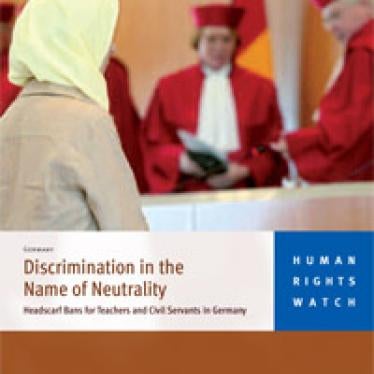Muslim veiling is once again at the top of the news in Europe. Bans on full-face veils being considered or already in place, whether nationwide, at the municipal level, or applied in public buildings and transportation, undermine Muslim women's autonomy and religious freedom. Arguments put forward to support these bans fall into four categories, none of which stand up to serious scrutiny.
Banning the veil will liberate women. Generalisations about women's oppression under the veil do a tremendous disservice to one of the basic tenets of gender equality: a woman's right to self-determination and autonomy. Restrictions on women wearing the veil in public life are as much a violation of the rights of women as is forcing them to wear a veil. Muslim teachers in Germany we interviewed said they wore the headscarf out of choice. Bans on headscarves in some German states have led many teachers to abandon their chosen profession, leading to loss of independence, social standing and financial wellbeing. It is clear that many Muslim women in Europe who cover themselves do so out of choice. For those who are coerced, general bans would limit, if not eliminate, their ability to seek advice and support. It may leave them trapped at home, further isolated from society. European governments need to support these women, with better access to education, justice and employment, rather than put them under more pressure.
The veil should be banned for security reasons. A wholesale ban on the full Muslim veil is a disproportionate response to the legitimate need in a variety of situations to ascertain someone's identity. Airport checks, school pick-ups, administrative dealings with state officers, cashing a cheque - these are all obvious examples. Appropriate, sensitive measures can be adopted to satisfy both the individual's right to manifest her religious beliefs and her duty to identify herself. In all the situations mentioned above, a woman wearing the full veil can be asked to take off her veil in private.
Bans on religious dress preserve secularism. The principle of state neutrality requires state institutions to refrain from imposing any particular set of religious views, while at the same time allowing for free expression of religious beliefs within society. Bans that deny people the right to wear in public places a style of clothing linked to a particular religious faith undermine, rather than protect, this principle, by defining the public space as a zone in which no-one is permitted to manifest his or her religion.
Banning the veil is necessary for integration. The fact that the children of immigrants and converts, as well as newer immigrants, wear the full-face veil in Europe undermines the argument that a ban is necessary for the purposes of integration. Integration policies that require newcomers to shed fundamental aspects of their identity are unlikely to succeed. Banning full-face veils is likely to restrict rather than enhance opportunities for these women to engage with society as a whole.
The divisive debate about full Muslim veiling reflects the complex issues - and passions - involved. International human rights law cannot answer all of the issues involved, but it can help frame a constructive conversation. It requires that any interference with rights must have a legitimate reason and be the least restrictive possible. It's fundamentally about the role of the state in matters relating to personal autonomy and religion, thought and conscience. Victims of coercion and abuse deserve assistance - but a ban is more likely to harm than help them. And the convictions of those who choose to wear the veil deserve consideration.







